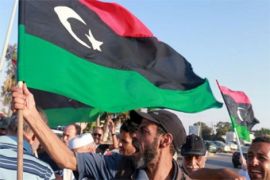"We guarantee that we are going to build a nation that respects human rights and does not accept the abuse of human rights. But we need time," he told a press conference shortly after the vote.
On the issue of the former rebel fighters who defeated longtime strongman Moamer Kadhafi, he said his administration would work with the fighters to restore stability.
"We are very aware that our brothers, the revolutionairies, the fighters, share the same opinion as us. They also believe that the stability of the country is extremely important."
Kib, who hails from the Libyan capital Tripoli, came out in front in the battle for the post ahead of four other candidates in the first round, winning 26 out of 51 votes cast by members of the National Transitional Council.
The chairman of the NTC, Mustafa Abdel Jalil, was the first of the council members to cast his ballot. "This vote proves that Libyans are able to build their future," he said.
A graduate of the universities of Tripoli, Southern California and North Carolina State, Kib has taught at several colleges as well as the Petroleum Institute in the United Arab Emirates.
He has been a researcher in electrical power engineering and is an author of numerous research papers.
NTC official Mustafa al-Mana said 52 members of the council had been asked to choose from five remaining candidates after the withdrawal of five others, including NTC vice president Abdel Hafez Ghoka.
Among the other main candidates were interim oil minister Ali Tarhuni and Idriss Abu Fayed, former opponent of Moamer Kadhafi who had been jailed under the ousted dictator`s regime, and Ali Zidan, an NTC representative in Europe.
The NTC, having declared the country`s "liberation" three days after the October 20 capture and killing of Kadhafi, launched a roadmap to a new Libya with a 20-month countdown to a general election.
A transitional government is to organise within eight months the election of a 200-member assembly, or "general national congress."
The NTC, which was formed in Benghazi in late February, will step down once the congress, taking over as the legitimate representative of the Libyan people, holds its first session.
The congress will have up to two months to name a prime minister, whose newly-formed government will be put to a confidence vote and form a commission to draw up a constitution.
One month later, the constitution will be put to a referendum. If it is adopted, the congress has 30 days to draw up an electoral law and polls are to be held within six months.
The congress will have 30 days to approve the results of the election and another 30 days to convene an elected parliament, formally ending the transition period. (*)
Editor: Kunto Wibisono
Copyright © ANTARA 2011











